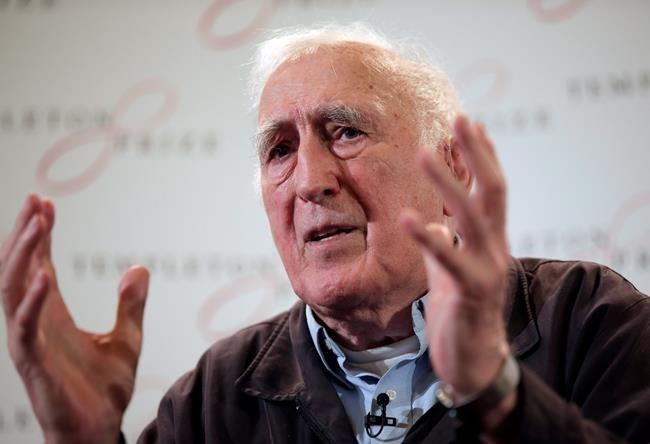
Jean Vanier, the founder of L'ARCHE, gestures as he talks during a news conference, in central London, Wednesday, March 11, 2015. Canadian schools and organizations associated with the late Jean Vanier are facing difficult decisions in the wake of a report that found the once-revered figure sexually abused at least six women.THE CANADIAN PRESS/AP, Lefteris Pitarakis
Republished February 24, 2020 - 6:48 PM
Original Publication Date February 24, 2020 - 12:36 PM
The release of a report that found non-profit founder Jean Vanier sexually abused at least six women sent a shock wave through the Canadian institutions associated with him, leaving many facing difficult decisions on how to disassociate from a man once considered a hero.
L'Arche International said in a report that Vanier — a prominent Canadian Catholic figure who died last year at the age of 90 — had "manipulative sexual relationships" with at least six women between 1975 and 1990 in which he "used his power over them" to take advantage of them.
"The alleged victims felt deprived of their free will and so the sexual activity was coerced or took place under coercive conditions," the report, commissioned by L’Arche last year and prepared by the U.K.-based GCPS Consulting group, said. None of the women were disabled.
The news has both devastated and worried members of L'Arche Daybreak in Richmond Hill, Ont., part of an international network of communities that support people with intellectual disabilities.
"So many of us are feeling so shocked, saddened, and the word that keeps coming back is betrayed," Trish Glennon, a community leader at L'Arche Daybreak, said Monday.
Vanier, son of former governor general Georges Vanier, worked as a Canadian navy officer and professor before turning to Catholic-inspired charity work.
He founded L'Arche in 1964 as an alternative living environment where those with developmental disabilities could be full-fledged participants in the community instead of patients.
Glennon admitted she worries the revelations about the group's founder will taint public perception of the non-profit.
She said the last few days have been difficult, given that many in the organization knew Vanier personally and considered him an inspiration. But now, she says, L'Arche will find inspiration from his victims instead.
"We have so much respect for those women who came forward and who stood up and finally told their story, and ... I really believe the courage of those women, I really believe helps us as an organization," she said.
A number of Catholic schools across Canada are named after Vanier, and some have also begun debating whether to strip his name from their institutions.
At least one Ontario Catholic school in Milton is already considering a name change, while the Toronto Catholic District School Board expressed concern about the impact of the news but said it was too early to make a decision.
In a statement, the Regina Catholic School Division said it expects to have conversations with the school community as well as the Archdiocese before deciding whether to rename Jean Vanier School.
"The school is carrying on with business as usual," said Twylla West, the board's communications co-ordinator. "We're praying for the victims, and all victims of abuse, and thinking of their courage."
A website for the Jean Vanier Association announced it was shut down until further notice, instead directing visitors to L'Arche's site. But Cardus, a Christian think tank, decided to leave videos and articles featuring Vanier on its platform, accompanied by a statement acknowledging the abuse.
Daniel Proussalidis, the group's director of communications, said the group also published an article denouncing Vanier's acts while allowing his words to remain on their website, "hoping the truths he spoke publicly and the good being done at L’Arche will endure."
Representatives from the Order of Canada and the Order of Quebec did not confirm whether any discussions were underway to strip Vanier of awards. Jean Auclair, a spokesman for the province, said any such discussions would be confidential.
Glennon, for her part, said it is too early to say what steps L'Arche will eventually take in regards to acknowledging Vanier and his now-tarnished legacy, but she expects discussions will take place with the international community in the coming weeks and months.
For now, staff and volunteers at L'Arche have been focused on supporting their members with intellectual disabilities and those who live among them. She stressed that L'Arche is more than just its founder.
"I do still believe in our mission, and I believe what we've created together," she said. "I believe that that mission will continue."
This report by The Canadian Press was first published Feb. 24, 2020.
News from © The Canadian Press, 2020